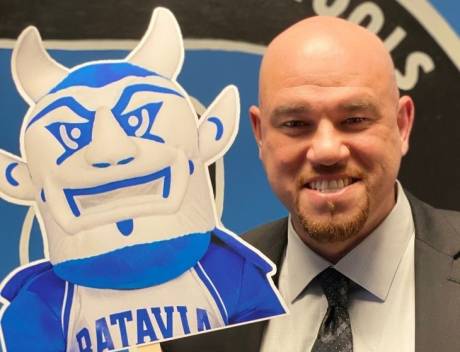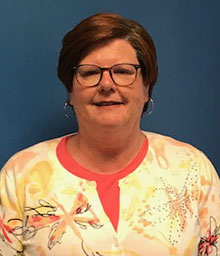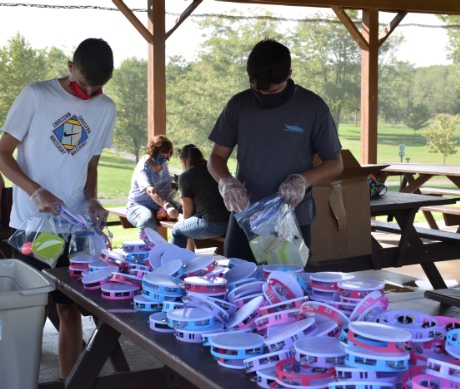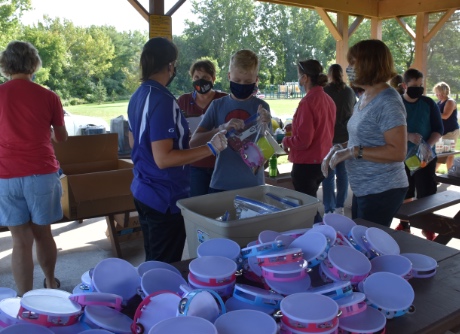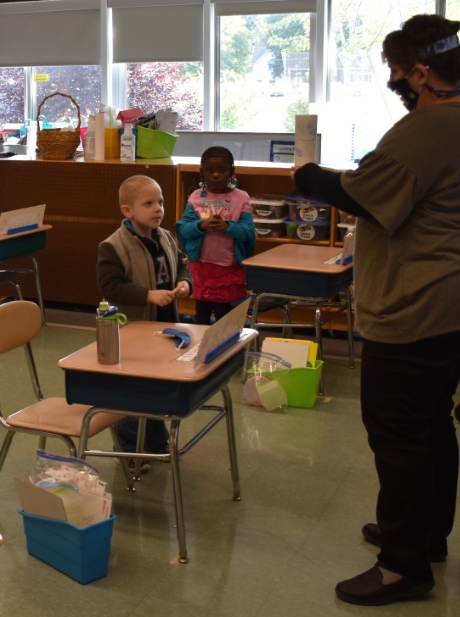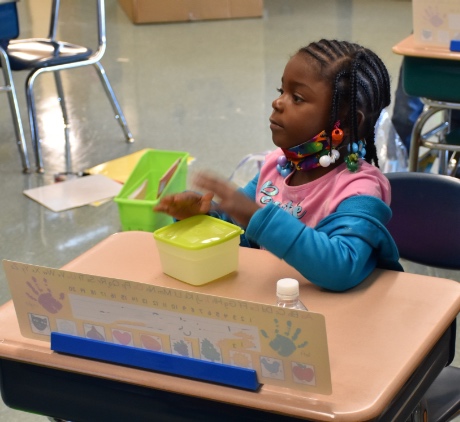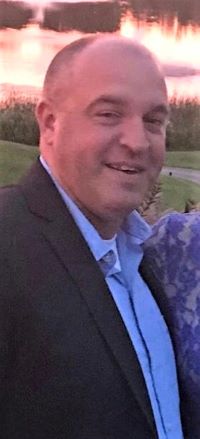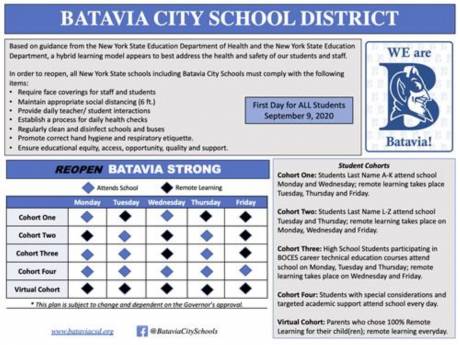Two days in school; three days learning remotely from home.
That is a possibility, at least at the beginning, for the 2020-21 year for students in the Batavia City School District.
Superintendent Anibal Soler Jr. tonight presented a sample weekly schedule at the district’s monthly Board of Education meeting livestreamed over its YouTube page.
Speaking for nearly an hour, Soler touched on various scenarios that he and the Batavia Reopening Strong Task Force are facing with the start of school less than two months away.
How students will be educated certainly is up in the air thanks to COVID-19 and its impact on Gov. Andrew Cuomo’s decision-making process.
Last week, the governor announced that a school will be able to reopen only if its region is in Phase Four and that the daily infection rate in that region is at 5 percent or lower over a 14-day average. Furthermore, if a school does reopen, face coverings, social distancing, health screenings and strict cleaning guidelines will come into play.
The state education department has issued a 145-page reopening document, covering a wide spectrum of topics, such as submission of reopening plans (which are due by July 31), communication, health and safety, facilities, nutrition, transportation, social/emotional well-being, attendance, technology, athletics and extracurricular activities, special education and staffing.
Soler said the district’s reopening plan revolves around three options – in-person learning, 100-percent virtual (distance) learning, and a mix of the first two models.
If it comes down to the third choice, it is conceivable that – depending upon the day of the week and the first letter of their last name -- on a particular day, some students would be in school and some would be receiving instruction remotely online.
While emphasizing that nothing is etched in stone at this point, Soler offered a daily schedule that could look like this:
Monday – Pre-kindergarten through 12th grade: virtual learning, but students at Genesee Valley Educational Partnership across the street from the high school (BOCES and Commercial Trades) would have in-person learning.
Tuesday – Pre-K through 12th grade with last names ending in A-K, in-person; last names ending in L-Z, virtual.
Wednesday – A-K, virtual; L-Z, in-person.
Thursday – A-K, in-person; L-Z, virtual.
Friday – A-K, virtual; L-Z, in-person.
This schedule would hold true for all students unless their parents opted for 100-percent virtual learning, Soler said.
When asked about the alternating schedule’s effect on parents’ child care plans, Soler said the idea was to have set in-school, out-of-school days so parents could plan their child care accordingly. He did acknowledge, however, that “we imagine that no model is going to suffice with (parents’) day care schedule …”
Soler said the district is asking parents “to make a choice that they can live with and support as a family, knowing that in-person is up to five days,” he said, adding that an online registration form has been created for parents to indicate their preferences. “It probably won’t be every day if 2,000 people choose that choice (in-person learning).”
He said that as of this morning, 300 of 500 respondents chose in-person schooling while 75 or so opted for 100-percent virtual online. In the end, Soler said he thinks enough students will opt for 100-percent virtual, which will enable the district to “dedicate a workforce of teachers to just be virtual and work with those kids.”
But, he said, “some parents have said, ‘I’m not going to send my child back; I don’t feel comfortable and I don’t feel safe until there’s a vaccine.' ”
About 60 parents checked “other” – an option that could mean that their child will be homeschooled.
Soler said the district will call parents who chose “other” and, if applicable, will clarify the difference between homeschooling and virtual online teaching.
He also said that all staff members, including administrators, are expected to report to their school building every day, unless they “qualify for some kind of leave or were physically unable to work.”
The superintendent told board members that he was “hesitant” to reveal the sample schedule at this time, but did so “because when we share this (with the task force) on Friday … the word will get out there, so we’re trying to be proactive and transparent.”
He said the plan could be changed if a large number of students choose to be taught remotely – “then everybody will be able to come every day because we have so many people signed up virtually.”
Other highlights of his report to the board:
-- Administrators are exploring the use of Robert Morris on Union Street, the former elementary school building, to provide more in-person opportunities. “The challenge for us is staff; we don’t have more teachers, so we’re looking at how we can use aides,” he said.
“How do we feed them if they’re at Robert Morris because we’re required to feed everybody – (breakfast and lunch) whether they are in-person or signed up for remote (learning).”
-- Sanitation, cleanliness and other health-related mandates will result in increased costs.
Soler said he estimated that providing disposable masks to every student and staff member would cost the district about $800,000. He also said the district is looking at hiring more janitors and already has purchased “jet packs” for deep cleaning and polycarbonate sheets to block offer areas in the main offices.
“We still have a responsibility to clean every day – and will probably alter our cleaning staff schedule to be more of an afternoon/evening schedule,” he said, adding that staff would be charged with teaching proper hand washing and making sure hand sanitizer and cleaning supplies are readily available.
-- Social distancing will result in fewer students per class. He said that the 6-foot-apart rule will drop class sizes from around 24 to about 10-14, depending upon the square footage of the room. Also, students will have to eat in their classrooms because of the restriction on crowd size in the cafeteria.
For those in chorus or band, for example, the social distancing requirement increases to having to be 12 feet apart.
Also, the capacity on the bus will decrease considerably, from 50 down to about 22. Fortunately, a recent district survey revealed that parents overwhelmingly indicated they will transport kids to and from school if necessary.
-- Fall sports have been delayed until Sept. 21. “That’s a big impact; a lot of kids rely on fall sports. What does that mean for us as we reopen?” Soler asked.
-- Soler said the district will have a mobile app that mirrors its website to go along with the reopening plan. He said parents and students will be able to livestream to find out the lunch menu or the sports schedule for the day, for example.
In the end, Soler seemed resigned to the fact that it’s virtually (no pun intended) a no-win situation.
“If we do this perfectly, everyone still won’t be happy. Our team is working very hard … trying to look at all perspectives,” he said. “At the end of the day, everybody wants everybody back – in what was termed normal conditions, no mask, no social distancing, full bus, full activities, full sports, and we just can’t do that.”
He noted that field trips may have to be put on hold and other events may have to proceed without spectators.
“Imagine having a concert with no one in the audience,” he said. “That’s what we’re looking at, those kinds of things. It breaks my heart.”
The governor is expected to make his final decision during the week of Aug. 1-7.
In other developments:
-- Soler reported that 129 students are enrolled in a virtual summer school for pre-kindergarten through eighth grade, with some individual in-person components.
The program, coordinated by Bernadette Krumpek, is focused on math, reading and writing. A different learning model for students in grades 9-12 also is available.
-- The board voted in favor of a contract with the City of Batavia for a School Resource Officer for 2020-21, with the district to fund the salary and benefits of the officer. The district budgeted $125,000 for the full year.
The City would be responsible for the SRO’s vehicle, uniform, equipment and training. The Batavia City Council is expected to vote on the resolution at its Aug. 10 meeting.
-- Mark Warren, president of the Batavia Teachers’ Association, issued a statement indicating its support and involvement in the district’s reopening task force.
“The members of the Batavia Teachers’ Association miss our students and we would love nothing more than to return to a normal pre-COVID school building, but that is not the reality at this time,” he said.
“We are working as part of the Reopen Batavia Strong Task Force to create a reopening plan that meets the educational needs of the school district and focuses on the health and safety of the students, faculty, staff and community, based on the directives and parameters released by the state, created by experts and backed by science.”

